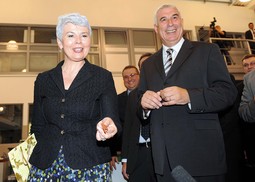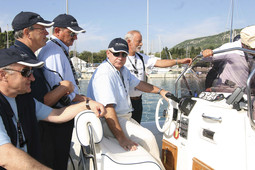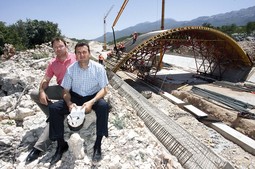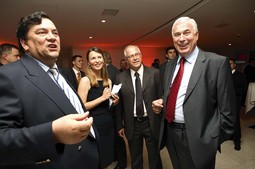Published in Nacional number 716, 2009-08-03
CROATIAN BULLDOZERS face a banking wall
Downfall of the construction cartel
CROATIAN GOVERNMENT has backed out of contracts to build 7 billion kuna worth of roads and bridges, dealing a serious blow to the construction lobby which has for years not only made enormous profits but also dictated Government policy
 COLLUSION BETWEEN THE HDZ AND CONTRACTORS Prime Minister Jadranka Kosor and IGH CEO Jure Radic; since 2004 Government has taken on significant debt to build roads and bridges, and all the contracts went to the IGH, Konstruktor Inzenjering, Viadukt, Skladgradnja, Osijek Koteks and Hidroelektra companiesLast week's order from Government to state-owned HAC (Croatian Motorways Company) to annul contracts for the construction of 7 billion kuna worth of motorways, trunk roads and bridges on which construction has not yet begun, has marked the end of an era of irresponsible expenditure of money Government has for years borrowed abroad, most of which has, by way of road construction, poured into the pockets of a handful of construction firms close to HDZ officials. The decision will also be a blow to the powerful construction lobby that has over the past five-six years become dangerously intertwined with the executive branch of government and with state-owned firms. It seems that, like a cartel, they were dictating the pace and cost of all the large-scale infrastructure projects Croatia had undertaken during Ivo Sanader's term in office.
COLLUSION BETWEEN THE HDZ AND CONTRACTORS Prime Minister Jadranka Kosor and IGH CEO Jure Radic; since 2004 Government has taken on significant debt to build roads and bridges, and all the contracts went to the IGH, Konstruktor Inzenjering, Viadukt, Skladgradnja, Osijek Koteks and Hidroelektra companiesLast week's order from Government to state-owned HAC (Croatian Motorways Company) to annul contracts for the construction of 7 billion kuna worth of motorways, trunk roads and bridges on which construction has not yet begun, has marked the end of an era of irresponsible expenditure of money Government has for years borrowed abroad, most of which has, by way of road construction, poured into the pockets of a handful of construction firms close to HDZ officials. The decision will also be a blow to the powerful construction lobby that has over the past five-six years become dangerously intertwined with the executive branch of government and with state-owned firms. It seems that, like a cartel, they were dictating the pace and cost of all the large-scale infrastructure projects Croatia had undertaken during Ivo Sanader's term in office.
"The construction lobby has government in the palm of its hand," said some experts in an attempt to explain the transport policies of the current Croatian Government, of which the Peljesac bridge project is just a symbol. The freezing of road construction will also have implications on Croatian political life; in particular as regards squabbles within the HDZ, whose leaders have installed their people in key posts in state-owned firms for road construction and provided some companies with lucrative contracts. These powerful contractors are not likely to give up a billion euro of work without putting up a fight, and the consequences will also be felt within the ruling coalition, because Government had pushed some of the projects it is now backing out of, like the Podravina trunk road, during the elections for its coalition partner the HSS.
What has been dubbed the "Metkovic" lobby will see a significant loss of influence, as will the political status of its leader, Speaker of Parliament and one of the most powerful HDZ figures Luka Bebic. Over the past two years Bebic has, through his people, taken control of two key state-owned road construction firms - Hrvatske autoceste (the Croatian Motorways Company) and Hrvatske ceste (the Croatian Roadways Company), and was the chief mover and shaker in personnel management at Hrvatske zeljeznice (the Croatian Railway Company). Bebic installed Metkovic native Jurica Prskalo at the post of Director of the Rijeka-Zagreb Motorway Company, before installing him at the head job in the Croatian Motorways Company. He played the key role in appointing Stjepko Boban to Prskalo's previous post. Boban would go on to become the chief advocate of the Peljesac bridge.
Radimir Cacic, the former Public Works, Reconstruction and Construction Minister, who launched a major series of road construction projects in Croatia, warns of irregularities in the system of awarding contracts on major construction projects financed by Government. He feels that the lack of money will come as a serious blow to all firms living off Government contracts. "Some of the large construction companies, like Skladgradnja, practically did not exist before the state started the practice of paying more for jobs than they are worth. Companies not used to operating on a free market will face serious difficulties. They are dependent on money from the state, and there is not very much of that now, or none at all and clearly there will be conflicts about who is going to get it. It think Sanader was very much aware of what would follow after his resignation. On the other hand, for so long as the HDZ is in power the construction lobby will also not lose power, because the HDZ and the construction lobby are one and the same. How is it possible that Jure Radic decides on whether or not the Peljesac bridge is to be built? When the top man at a private contracting firm makes decisions that in a normal country are Government's to make, it is clear who rules this land."
And it is Radic in fact, the CEO of the IGH Company, a privately owned firm one of whose owners is Construction Minister Marina Matulovic-Dropulic, who stands as the leader of the lobby of contractors and politicians that run Croatian road construction. At state-sponsored tenders the IGH regularly wins contracts to design infrastructure, which is thenbuilt by a well-oiled team made up of the Konstruktor Inzenjering, Viadukt, Skladgradnja, Osijek Koteks and Hidroelektra companies. Government, of course, did not decide to put an end to this established way of doing business, which contributed to creating a corruptive setting, in which the politically suitable get rich off the taxpayer, but rather because the Croatian Motorways Company (HAC), the state-owned firm that covers most of the road construction in Croatia, has nowhere else to borrow money from to finance these projects. The financial and economic crisis has exhausted the world's investment institutions, and as a result of disorderly public finances Croatia and its companies have seen their credit rating drop, making money even harder to come by. The only ones that have agreed to discuss financing are the European Bank For Reconstruction and Development (EBRD) and the European Investment bank (EIB). IVO SANADER in the company of the Director of the Split offices of the IGH Company Zarko Deskovic – yet another pebble in the mosaic of collusion between politicians and contractors
IVO SANADER in the company of the Director of the Split offices of the IGH Company Zarko Deskovic – yet another pebble in the mosaic of collusion between politicians and contractors
Under, however, a key condition that will have far-reaching consequences for the future of Croatian construction companies, which will have to adapt to a different way of doing business when it comes to Government contracts. The EBRD and the EIB, namely, are making their lines of credit conditional on annulling all existing construction contracts and issuing new tenders that will be closely overseen by experts from these financial institutions.
The matter is quite clear - we will provide you with credit, the message is from Europe, but you will spend the money the way we want it spent. The launch of large-scale infrastructure projects in 2000, such as the construction of the Zagreb-Split motorway was a massive boost to construction firms in Croatia after almost ten years of scratching out a living. Large contractors were on their feet again, but they could not take the lion's share of the cake because it had been previously contracted that the US firm Bechtel would build the highway to Split. The golden era for local construction firms started with the departure of Bechtel and the coming of the HDZ into power in 2004.
At the time when this wave of construction started, i.e. during the term in office of Former Prime Minister Ivica Racan, and chief organiser Radimir Cacic, the most costly kilometre of motorway cost 4 million euro. Ever since Ivo Sanader's administration inherited the road construction project and the portfolio was picked up by Bozidar Kalmeta, the price of a kilometre of motorway has risen to 17 million euro. The reasons why the cost of building roads went up more than four times in the space of just a few years has never been explained by the current Government. Cacic warns that there are no objective reasons for this growth in prices. "The only logical explanation is in the incompetence and corruption of the people who lead these projects. Construction is a quite precise line of work, the cost of construction is the sum of the cost of labour and the cost of material, and these two categories have risen over the past 6 years by about 21 percent. This is something that every citizen can see for himself or herself if they compare prices in other construction sectors, like residential construction. Costs have, then, risen by 21 percent, while the final cost of building roads has gone up over 400 percent.
Government was paying these ridiculously inflated prices with money borrowed for foreign creditors; money Croatian taxpayers will have to pay back. Now foreign creditors no longer want to finance this model of road construction, and are making what they will finance conditional on the transparency of public tenders. This condition is in fact a direct message from Europe to the HDZ Government that what they have been doing so far is daylight robbery and that they will no longer be able to operate that way." Numerous cases, uncovered by the press or made public by some opposition politicians, point to corruption in road construction. The latest of these, the purchase of land on the route of the road leading to the Peljesac bridge, point to the real reasons for embarking on the project. The IGH Company, which came up with the idea of building the Peljesac bridge, and the Konstruktor Inzenjering Company, which is to build it, purchased over 2 million square metres of agricultural land through Split businessman Vincenco Blagaic, which Government would then buy from them at a significantly higher price. Just on that part of "Operation Peljesac" IGH and Konstruktor were to have picked up 90 million euro. Two years ago SDP MP Ivica Pancic showed documents in Parliament from which it was evident that the costs of building a state road between Gazenice and the Zadar II junction had inexplicably risen from a planned 250 to 450 million kuna. Pancic at the time stated that someone had "through many irregularities and corruption put 26 million euro in their pocket." The scandal has not been resolved to this day.
As a result of pushing projects that many experts warned were overly expensive and not viable on the long term one got the impression that contractors had Government under siege, and decided on what was to be built, where, and at what cost. A closer look at the ownership structure of the most powerful among them, the IGH Company, shows that it is in fact a cartel, whose representatives have permeated every pore of the executive government, research institutions and the managements of the state-owned companies that plan and finance road construction, creating what is perhaps the most powerful econo-political organisation in the country. It is not, therefore, the contractors who have taken control of Government, but rather people in executive government in collusion with private firms who together form the so-often cited construction lobby. The construction cartel gathered around the IGH Company, at whose helm stands Jure Radic, a man who has passed through practically all of the leading positions in the HDZ and Government - he has served as science minister, then as minister of development and reconstruction, as the HDZ general secretary and vice-president, has been the number two in Government and the chief of staff to the late President Franjo Tudjman.
 SLAVEN AND JOZO ZUZUL, owners of the Skladgradnja CompanyBesides the top post at the IGH Company, Radic now also leads the department for bridge construction at the University of Zagreb's Faculty of Civil Engineering. And while Radic claims that the company's strength lies in its expertise, and the number of engineers and experts in its employ, and not in lobbying, his words are rendered suspect by the fact that many local and national officials have worked for the company and now, among other things, decide on zoning plans and on which companies will get the contracts financed from local budgets and the national budget. Aleksandar Caklovic, a member of the board of the Zagreb - Macelj Motorway Company, which finances this highway on behalf of Government, sits on the Supervisory Board of the IGH. There is no need to underline the fact that the IGH took part in building the Zagreb - Macelj motorway. Caklovic has also served as the chairman of the board at the Croatian Roadways Company. Slavko Kojic, the head of the City of Zagreb Office of Finances and a former IGH employee is a co-owner of IGH and sits on its Supervisory Board. IGH gets its biggest contracts in Zagreb, like the reconstruction of Branimirova Street, a waste management study, the construction of a bridge over the Sava River and the expansion of Zagreb Airport.
SLAVEN AND JOZO ZUZUL, owners of the Skladgradnja CompanyBesides the top post at the IGH Company, Radic now also leads the department for bridge construction at the University of Zagreb's Faculty of Civil Engineering. And while Radic claims that the company's strength lies in its expertise, and the number of engineers and experts in its employ, and not in lobbying, his words are rendered suspect by the fact that many local and national officials have worked for the company and now, among other things, decide on zoning plans and on which companies will get the contracts financed from local budgets and the national budget. Aleksandar Caklovic, a member of the board of the Zagreb - Macelj Motorway Company, which finances this highway on behalf of Government, sits on the Supervisory Board of the IGH. There is no need to underline the fact that the IGH took part in building the Zagreb - Macelj motorway. Caklovic has also served as the chairman of the board at the Croatian Roadways Company. Slavko Kojic, the head of the City of Zagreb Office of Finances and a former IGH employee is a co-owner of IGH and sits on its Supervisory Board. IGH gets its biggest contracts in Zagreb, like the reconstruction of Branimirova Street, a waste management study, the construction of a bridge over the Sava River and the expansion of Zagreb Airport.
One should bear in mind that Mario Crnjak was the Director of HAC during Ivo Sanader's first term in office, and is also a co-owner and one of the regional directors of IGH. According to data from the Croatian Motorways Company, IGH won HAC contracts worth half a billion kuna during the four years Crnjak led the state-owned company.
But the most patent example of interwoven public and private interests is the fact that Marina Matulovic-Dropulic, Minister of Environmental Protection, Physical Planning and Construction, is a co-owner of IGH. And although she holds the state portfolio that adopts, accepts and approves the construction strategy for the country's entire infrastructure network, and decides on where are what is to be built, the issue of a conflict of interest for Minister Matulovic-Dropulic has never been official raised. She is, besides, at a post at which key decisions are made, and as a shareholder she is privy to confidential information, on which she earned more and more money every year in the form of a dividend. Just in 2006 Marina Matulovic-Dropulic earned 74,850 kuna in IGH dividends. Minister Dropulic is also a member of the Supervisory Board of the Croatian Railways Company, a state-owned firm that awarded IGH with the 75 million kuna job of designing the railroad from Rijeka to Zagreb. The fact is that the IGH has over the past five years become one of the largest construction and design companies in Southeastern Europe, thanks above all to government contracts the company has won. Since this is a firm that is involved in design and construction supervision, companies with construction machinery and labour forces were selected to carry out the construction. And so IGH emerged as a leader of sorts for a lobby group that for the most part operates jointly - Radic and his team cover the design while Konstruktor Inzenjering, Hidroelektra and Viadukt carry out the actual construction with their ever-present subcontractor - the Zuzul brother's Skladgradnja Company.
That a web of relatives and friends also has a significant influence on how this group operates is demonstrated by another detail. Jure Radic is best man to Zeljko Zderic, the Director and owner of Konstruktor Inzenjering, and the top man at Konstruktor's Zagreb branch is the son of Petar Dukan, the chairman of the Supervisory Board and co-owner of IGH. Once it had infiltrated and connected with people in government the construction clique found it easy to decide on what would be built and how much it would cost. That national transport interests have become only an alibi for the personal accrual of wealth is well illustrated by the following example: in 2000 Croatian Government adopted a Croatian Transport Development Strategy that outlined the distribution of budget funds earmarked for the development of transport infrastructure. As Ivan Dadic, the dean of the University of Zagreb's Faculty of Transport and Traffic Engineering, explains, the document was never abided by. "The strategy precisely set out how budget funds earmarked for the development of transport infrastructure would be distributed.
It had been said that 40 percent of the total funds would go to road construction, 25 percent for railroads, 20 percent for maritime and waterborne transport, 10 percent for modern transport systems and terminals, and 5 percent for air traffic. Today, ten year down the road, it is evident that we have invested almost exclusively into road and motorway construction. ZELJKO ZDERIC, the Director and owner of Konstruktor Inzenjering, with Jure Radic
ZELJKO ZDERIC, the Director and owner of Konstruktor Inzenjering, with Jure Radic
But, what is worse still, we have completely ignored traffic in urban centres. We have, then, built much of what we do not need and almost nothing of what we do need. We have empty motorways - at the height of the tourism season just some ten thousand vehicles a day use them, which makes them among the least profitable roads in Europe. Instead of improving traffic in the cities and smaller settlements, we have spent billions of kuna building roads on empty fields, all so that someone could make as much profit as possible while not contributing to Croatian society." But, as a result of the economic crisis and the growth of illiquidity in the country the construction giants are themselves in trouble. The Croatian press recently reported that IGH was having trouble meeting payroll, while Jure Radic is saying that the wages will be paid even if it means he does not get his pay. But these problems were to have been a passing phase because the contracts Government continued to award them were to have been a stake for the future. But Government's decision to annul its contracts with construction firms and to suspend the four-year road construction plan has practically scrapped the existing model whereby Government took on debt abroad, providing guarantees to the Croatian Motorways Company so that private companies could get rich and taxpayers could pay back the money with interest down the road.
■ By some estimates the domestic construction lobby has turned over in excess of 15 billion euro in government jobs. In this period just the IGH won contracts from the HAC worth over 600 million kuna. The owners of Skladgradnja, relatives of Former Foreign Minister Miomir Zuzul, have earned 210 million kuna on government contracts during the five-year HDZ reign, while their revenues have grown an unbelievable 3400 percent over that same period.
Related articles
Barisic could bankrupt HDZ
Chief State Attorney Mladen Bajic could strike a massive blow against the ruling HDZ party with a single signature, and put the party into… Više
Latest news
-
28.10.2010. / 14:15
'A profitable INA is in everyone's interest'
-
28.10.2010. / 09:38
Sanader’s eight fear SDP — Won’t bring down Government
-
21.10.2010. / 15:02
Interior Ministry turned a blind eye on Pukanic assassination
-
20.10.2010. / 09:34
Barisic could bankrupt HDZ




